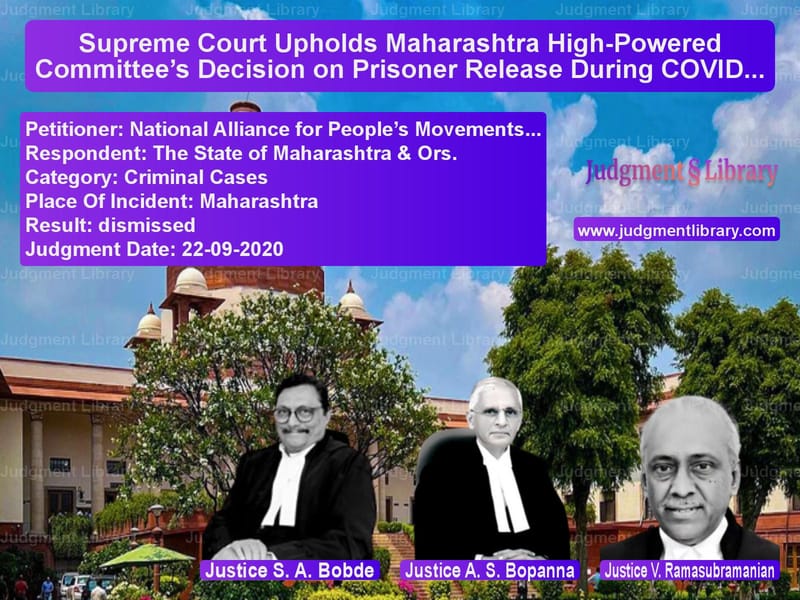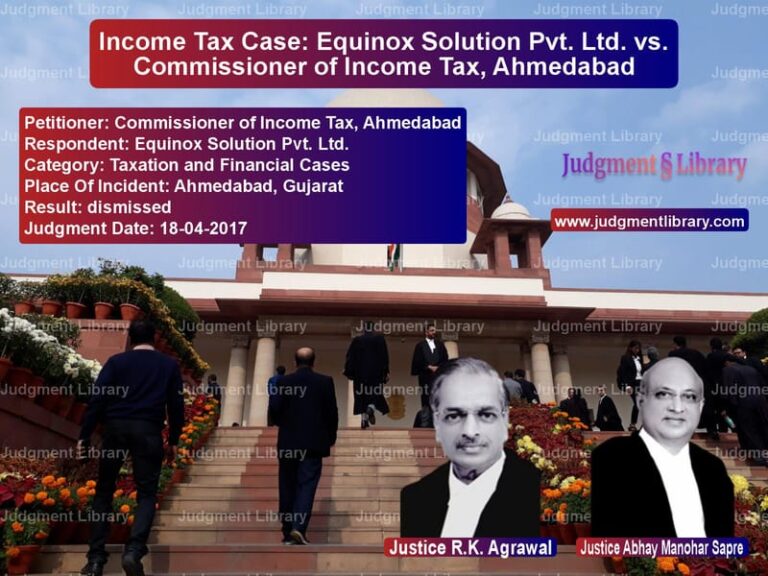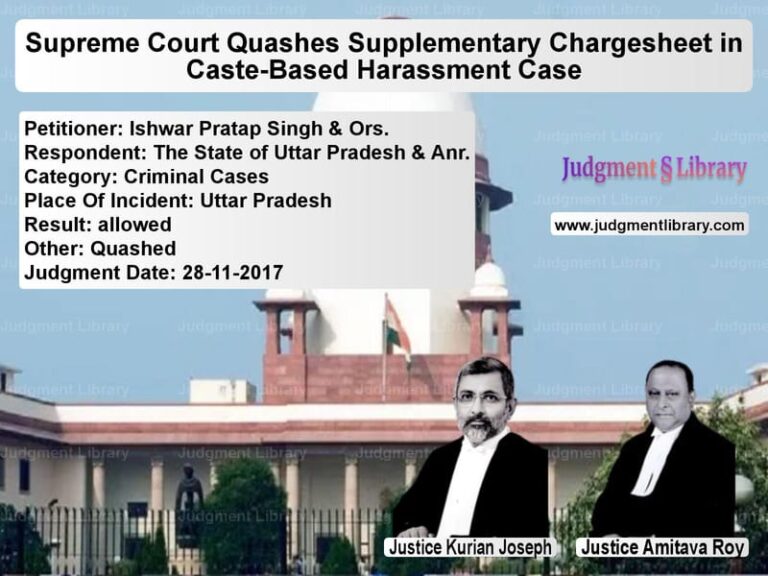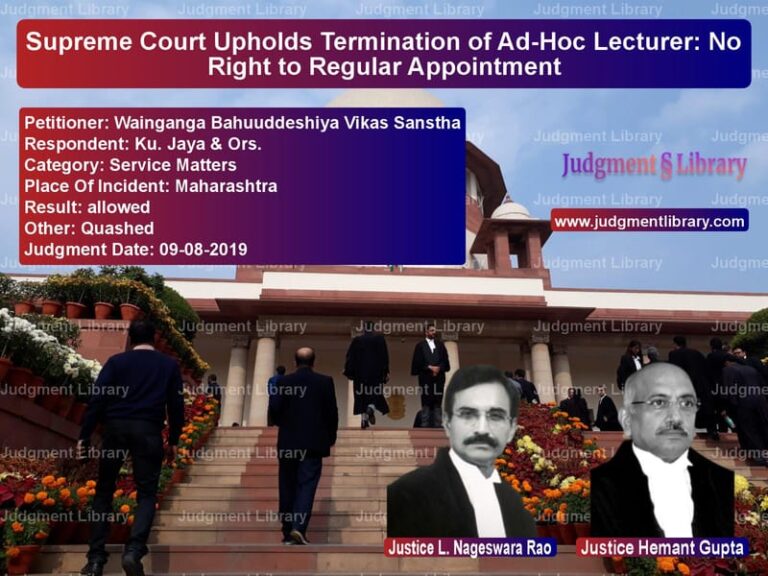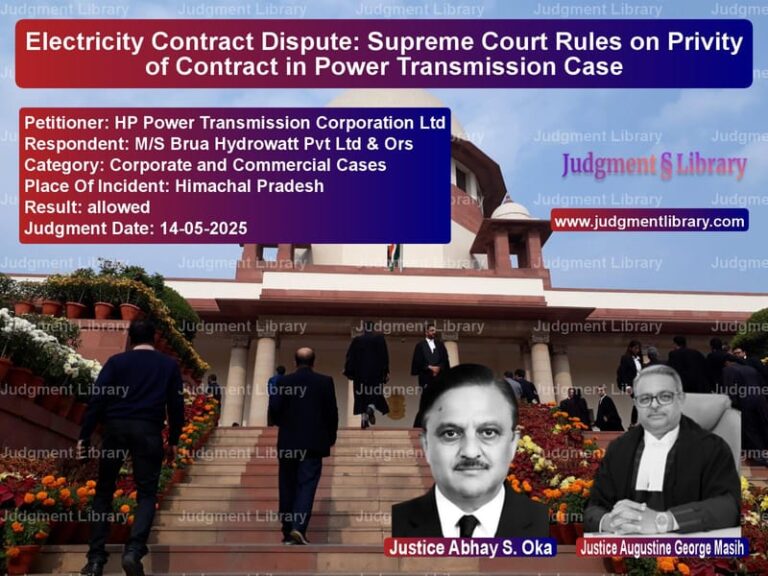Supreme Court Upholds Maharashtra High-Powered Committee’s Decision on Prisoner Release During COVID-19
The Supreme Court of India, in the case of National Alliance for People’s Movements & Ors. vs. The State of Maharashtra & Ors., delivered an important ruling concerning the release of prisoners during the COVID-19 pandemic. The case revolved around whether the High-Powered Committee’s (HPC) classification of prisoners for interim bail was discriminatory and whether it required judicial interference.
The Court upheld the HPC’s decision, affirming that it was based on reasonable classification and did not violate constitutional principles. The judgment reinforces the role of state authorities in determining pandemic-related prison policies while maintaining public safety.
Background of the Case
The petitioners, National Alliance for People’s Movements and others, approached the Bombay High Court through a Public Interest Litigation (PIL-CJ-LD-VC No.44/2020). They challenged the decisions of the Maharashtra HPC, which had classified prisoners into different categories for the grant of interim bail during the COVID-19 pandemic.
The HPC had classified prisoners into three categories:
- Undertrial prisoners or convicted persons sentenced to seven years or less.
- Convicted persons sentenced to more than seven years.
- Undertrial or convicted persons booked under serious economic offenses, bank scams, and offenses under special acts such as MCOC, PMLA, MPID, NDPS, and UAPA.
The petitioners challenged the exclusion of prisoners convicted for life imprisonment and those convicted under special acts from the benefit of interim bail.
Legal Issues and Arguments
The key legal issues before the Supreme Court were:
- Whether the classification of prisoners for interim bail by the HPC was discriminatory and violated Article 14 of the Constitution.
- Whether the condition imposed on life convicts (that they must have been released twice before on parole or furlough) was arbitrary.
- Whether the pandemic warranted a mandatory release of all eligible prisoners.
Arguments by the Petitioners
The petitioners, represented by Senior Counsel, argued:
- The HPC’s classification created an unfair distinction between prisoners with similar sentences.
- Prisoners convicted under special acts were unfairly excluded from consideration despite serving sentences of less than seven years.
- The requirement that life convicts must have been released twice on parole or furlough before being considered for bail was arbitrary.
- There was an urgent need to decongest prisons due to the spread of COVID-19, and all eligible prisoners should be released on humanitarian grounds.
Arguments by the State of Maharashtra
The State of Maharashtra, represented by Senior Counsel, countered:
- The classification was based on the severity of the offense and the potential threat to society posed by the release of certain prisoners.
- Special acts such as MCOC, PMLA, MPID, NDPS, and UAPA involve serious offenses where early release might not be in the interest of public safety.
- The requirement that life convicts must have been released twice before ensured that only those with a history of good behavior were released.
- The classification was in line with the Supreme Court’s earlier order allowing state governments to decide on prisoner releases.
Supreme Court’s Ruling
On Classification of Prisoners
The Supreme Court ruled that:
- The classification made by the HPC was reasonable and based on valid considerations.
- The exclusion of prisoners under special acts was justified due to the serious nature of their offenses.
- The requirement for life convicts to have prior parole or furlough releases ensured that only those with a record of good behavior were considered.
On Article 14 and Equal Treatment
The Court cited The State of West Bengal vs. Anwar Ali Sarkar (1952) and K.R. Lakshman vs. Karnataka Electricity Board (2001), reaffirming that:
- Equality before law does not mean identical treatment in all cases.
- Reasonable classification based on objective criteria is permitted under Article 14.
- The HPC had exercised its discretion appropriately given the pandemic.
On the Purpose of Interim Bail
The Court emphasized that the purpose of interim bail was not a statutory right but a temporary measure to decongest prisons. It ruled that:
- Prisoners could still apply for bail under normal legal provisions.
- The HPC’s decision struck a balance between public health concerns and public safety.
- There was no legal mandate requiring the release of all eligible prisoners.
On the Petitioners’ Grievance
The Court acknowledged that specific cases of discrimination could be raised through appropriate channels. It held that:
- If an individual prisoner was unfairly denied bail despite meeting the criteria, they could approach the courts separately.
- The HPC had the authority to modify its guidelines based on changing circumstances.
Final Decision
The Supreme Court dismissed the petition, ruling that:
- The HPC’s classification was valid and not arbitrary.
- There was no legal ground to mandate the release of all eligible prisoners.
- Petitioners could submit a representation to the HPC if they sought modifications in future guidelines.
Legal Principles Established
This ruling reinforces several key legal principles:
- Judicial Deference to Executive Decisions: Courts will not interfere with policy decisions unless they are arbitrary or unconstitutional.
- Reasonable Classification in Law: Different categories of prisoners can be treated differently based on objective criteria.
- Balance Between Public Health and Public Safety: Emergency measures must consider both humanitarian concerns and societal risks.
Conclusion
The Supreme Court’s decision in National Alliance for People’s Movements & Ors. vs. The State of Maharashtra & Ors. sets an important precedent for handling prisoner release policies during emergencies. By upholding the HPC’s classification, the Court reinforced the principle that judicial intervention is limited in executive policy decisions unless there is clear illegality.
This ruling ensures that pandemic-related prison policies remain flexible while maintaining law and order, providing clarity for future public health emergencies.
Petitioner Name: National Alliance for People’s Movements & Ors..Respondent Name: The State of Maharashtra & Ors..Judgment By: Justice S. A. Bobde, Justice A. S. Bopanna, Justice V. Ramasubramanian.Place Of Incident: Maharashtra.Judgment Date: 22-09-2020.
Don’t miss out on the full details! Download the complete judgment in PDF format below and gain valuable insights instantly!
Download Judgment: National Alliance fo vs The State of Maharas Supreme Court of India Judgment Dated 22-09-2020.pdf
Direct Downlaod Judgment: Direct downlaod this Judgment
See all petitions in Bail and Anticipatory Bail
See all petitions in Custodial Deaths and Police Misconduct
See all petitions in Fundamental Rights
See all petitions in Public Interest Litigation
See all petitions in SC/ST Act Case
See all petitions in Judgment by S. A. Bobde
See all petitions in Judgment by A. S. Bopanna
See all petitions in Judgment by V. Ramasubramanian
See all petitions in dismissed
See all petitions in supreme court of India judgments September 2020
See all petitions in 2020 judgments
See all posts in Criminal Cases Category
See all allowed petitions in Criminal Cases Category
See all Dismissed petitions in Criminal Cases Category
See all partially allowed petitions in Criminal Cases Category

